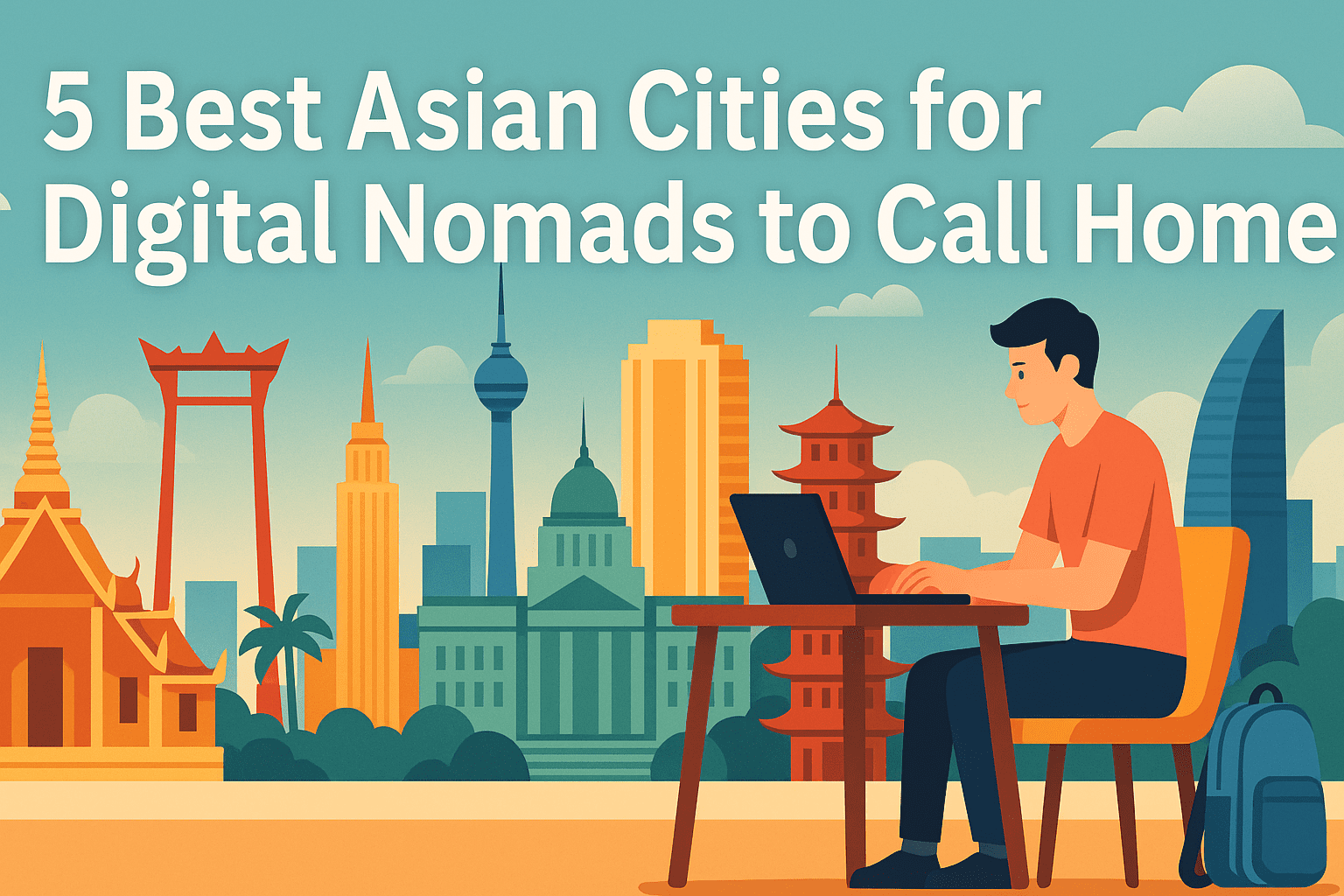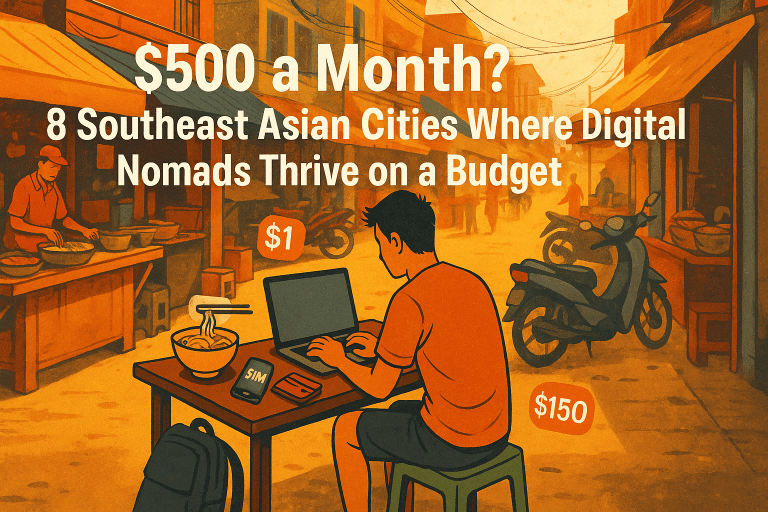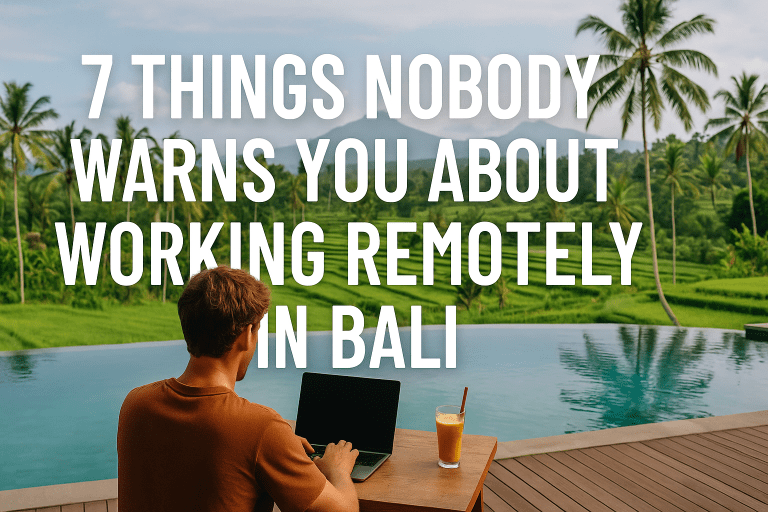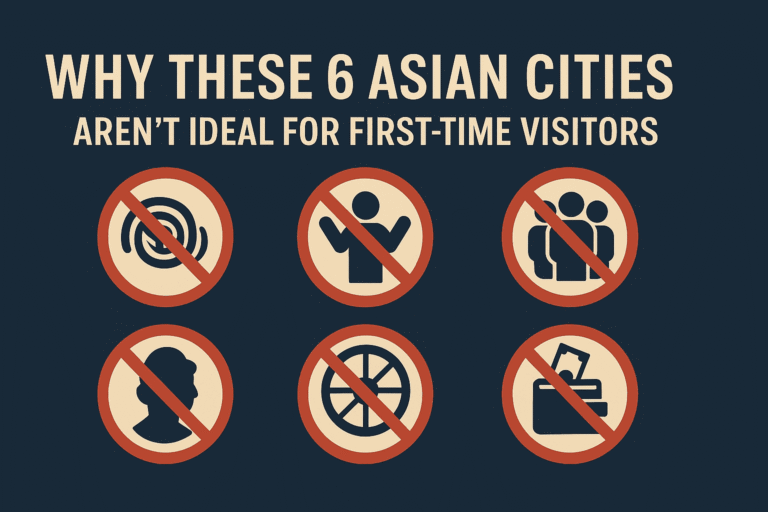
The dream of working remotely from an exotic location often brings to mind the vibrant landscapes and rich cultures of Asia. But beyond the stunning photos, finding a place to genuinely call home as a digital nomad requires navigating a maze of practicalities: visas, costs, community, and daily logistics.
For many, the biggest hurdles aren’t the work itself, but figuring out where you can realistically stay long-term and how to manage the essentials of daily life while balancing work and well-being. This article cuts through the romance to provide a direct, actionable look at five Asian cities that consistently rank high for their blend of affordability, infrastructure, community, and lifestyle, helping you make an informed choice grounded in reality.
Navigating the Foundation: Visas and Legal Stay in Asia
The single largest challenge for digital nomads in Asia is often securing a legal long-term stay without traditional employment. Most Asian countries don’t yet offer specific “digital nomad visas,” though this is slowly changing. This means that for many, staying long-term often involves understanding and utilizing tourist visa rules, which typically grant stays of 30 to 90 days.
Extended stays might require “visa runs” (leaving and re-entering the country to obtain a new tourist visa) or exploring more complex options like business or education visas, which have specific requirements and may not always be suitable for someone simply working remotely for an overseas employer. The feasibility of visa runs depends heavily on the country’s specific rules and your nationality. It is paramount to check the official immigration website for your destination country and nationality for the most up-to-date rules.
Flexibility and careful planning are essential; relying solely on continuous tourist visa extensions or frequent visa runs carries inherent risks and can be disruptive. Some cities, like those in Malaysia, have introduced options like the DE Rantau Nomad Pass, while others, like Thailand, now offer a Long-Term Visa (DTV). Understanding these nuances is the first step.
Cost of Living: Stretching Your Budget Across Different Hubs
Asia is renowned for offering a significantly lower cost of living compared to North America or Europe, but this varies dramatically from city to city. For digital nomads, understanding where your money goes furthest without sacrificing essential comforts is key. We’ll look at typical costs in our five chosen cities:
Chiang Mai, Thailand: Often cited as a foundational nomad hub. It offers perhaps the lowest cost of living among the top contenders. You can find decent one-bedroom apartments outside the city center for $300-$500 USD per month. Food, especially delicious Thai street food, is incredibly cheap, often just a few dollars per meal. Transport (scooters or ride-sharing apps like Grab) is affordable. A comfortable lifestyle here can be achieved on $1000-$1500 USD per month.
Bali (primarily Ubud or Canggu), Indonesia: Bali offers a tropical paradise vibe with costs slightly higher than Chiang Mai. A one-bedroom villa or apartment typically ranges from $500-$1000+ USD/month depending on location and amenities. While local food (Warungs) is cheap, the cost of Western food, trendy cafes, and imported goods adds up. Transport often involves scooters or taxis/Grab. A realistic comfortable budget is $1200-$2000 USD per month.
Kuala Lumpur, Malaysia: As a major capital, KL is more expensive than Chiang Mai or Bali but offers excellent infrastructure. A modern one-bedroom apartment in a nice area might cost $500-$800+ USD/month. Food is diverse and affordable, from hawker stalls to mid-range restaurants. Public transport is efficient and reasonably priced. A comfortable budget is typically $1500-$2500 USD per month. Comparing KL to Chiang Mai shows KL is generally more expensive overall, particularly for rent.
Da Nang, Vietnam: A rapidly growing coastal city. Cost of living is very attractive. A one-bedroom apartment near the beach can be found for $350-$600 USD/month. Local food is incredibly cheap and delicious. Transport is mainly scooters or affordable taxis/Grab. You can live comfortably here on $1000-$1500 USD per month.
Taipei, Taiwan: Located in East Asia, Taipei is significantly more expensive than the Southeast Asian options but still offers value compared to major Western cities. Rent for a one-bedroom apartment might range from $700-$1200+ USD/month, depending on the district. Food costs are moderate, with plenty of affordable local options. Public transport is excellent and inexpensive. A comfortable budget is likely $1800-$3000+ USD per month. The Economist’s cost of living index often includes Taipei among moderately expensive global cities.
These are just estimates, and your actual costs will depend on your spending habits, but they provide a solid baseline for comparison.
Infrastructure, Connectivity, and Finding Your Community
Reliable internet is non-negotiable for a digital nomad. Thankfully, internet speeds in major Asian cities are generally excellent, often surpassing speeds available in many Western countries. Mobile data is also widely available and affordable with local SIM cards, which are usually easy to obtain upon arrival, sometimes even at the airport like when using Asia airport survival hacks. Power stability can vary, with occasional outages possible in some areas, particularly outside major city centers, though this is less common in the cities discussed here. Coworking spaces are prevalent in all five cities, offering reliable internet, power backup, and a professional environment, typically costing $100-$250 USD per month for a membership.
Beyond the practicalities of work infrastructure, finding a community is crucial for well-being and preventing isolation. All five cities have established digital nomad and expat communities. Chiang Mai and Bali are arguably the most mature nomad hubs, with countless meetups, networking events, and dedicated online groups (primarily on Facebook) making it easy to connect. Kuala Lumpur and Da Nang also have active, though perhaps slightly smaller, nomad scenes. Taipei’s expat community is strong, though the digital nomad specific group might be less prominent than in Southeast Asia; however, the city’s safety and ease of getting around facilitate connections. Engaging in local activities, whether it’s yoga classes in Bali, language exchanges in Taipei, or cooking classes in Chiang Mai, is another excellent way to build relationships beyond the typical nomad circle.
Setting up local banking can be challenging without a long-term visa or local address, but options exist like using international digital banks or opening accounts in countries with more favorable policies if you plan to be in the region long enough. Transport is generally easy: ride-sharing apps like Grab are dominant in Southeast Asia and Taiwan (though Uber exists in some places), while Taipei boasts an exceptionally clean and efficient MRT system.
Addressing the Realities and Challenges
While the freedom of the digital nomad lifestyle in Asia is appealing, it comes with its own set of challenges. The primary one, as mentioned, is often the legal uncertainty of long-term stay. This constant need to monitor visa expiry dates, plan visa runs, or navigate complex application processes can be stressful and disruptive. Bureaucratic hurdles, varying from frustratingly slow processes to confusing requirements, are part of the experience in many countries.
Infrastructure, while generally good, can still have its moments – a power cut during a crucial video call or slower-than-expected internet speed in a remote area. Adjusting to cultural differences, language barriers (though English is widely spoken in tourist/expat areas, learning basic local phrases is essential and respectful), and different social norms requires patience and an open mind. Loneliness can also be a factor; while communities exist, they are often transient, and forming deep, lasting connections can take effort. Maintaining a healthy work-life balance can also be challenging when your home is also your office and surrounded by temptations to explore.
Anecdote: I remember my first visa run from Chiang Mai. I was nervous, having heard stories of people being denied re-entry. I meticulously checked the embassy website, packed everything I thought I’d need, and flew to a neighboring country for 24 hours. The process at immigration on re-entry was surprisingly smooth, just a few standard questions, and I received my new stamp. It highlighted that while the system requires navigating, following the official procedures and being prepared makes it manageable, turning a potential hurdle into a simple logistical step.
This ancient wisdom applies perfectly to the digital nomad journey. Taking that first step to research, plan, and choose a potential base city is crucial.
City Spotlights: Why These Five?
Each of these cities offers a unique blend of factors making them attractive digital nomad bases:
Chiang Mai, Thailand: Pros: Low cost of living, large and established nomad community, excellent cafes and coworking spaces, relaxed pace, access to nature. Cons: Can feel somewhat isolated from other parts of Thailand/Asia if you don’t fly, air quality issues during burning season (typically Feb-Apr).
Bali, Indonesia: Pros: Beautiful scenery, strong focus on wellness and lifestyle, vibrant spiritual community, many villa options with pools, large expat/nomad community. Cons: Can be more expensive than other SE Asian options, heavy reliance on scooters for transport (traffic can be bad), visa situation (B211A visa is common but often requires an agent, adding cost and complexity), can feel like a “bubble.”
Kuala Lumpur, Malaysia: Pros: Excellent infrastructure (internet, transport), affordable modern apartments, diverse food scene, major travel hub with easy access to the rest of Asia, cosmopolitan feel. Cons: Less traditional “nomad vibe” than Chiang Mai/Bali (more expats than transient nomads), tropical climate can be very hot/humid, certain areas lack walkability, visa options require research (DE Rantau or other workarounds).
Da Nang, Vietnam: Pros: Very low cost of living, beautiful long beach, developing infrastructure, friendly locals, delicious and cheap food, growing nomad scene, proximity to Hoi An. Cons: Nomad community is smaller and newer than Chiang Mai/Bali, less diverse international dining/shopping compared to larger cities, internet can be less stable than in capital cities, visa rules can change.
Taipei, Taiwan: Pros: Extremely safe, excellent public transport, high-quality infrastructure (internet, healthcare), vibrant modern culture with traditional roots, friendly locals, diverse food scene, relatively stable visa policy compared to some SE Asian countries. Cons: Higher cost of living than SE Asia, smaller dedicated digital nomad community (more traditional expats), language barrier can be more pronounced outside tourist areas, humidity in summer.
Choosing the “best” city depends entirely on your personal priorities: budget, desired lifestyle, importance of a large nomad community, preferred climate, and tolerance for visa hurdles. Consider which city aligns best with your workflow and work-life balance goals.
“The world is a book, and those who do not travel read only one page.”
Embarking on the digital nomad lifestyle in Asia is indeed like opening a new chapter. It requires diligence and preparedness, not just wanderlust.
Making it Happen: Actionable Steps and Resources
Deciding on a city is just the start. To make your move as smooth as possible:
- Research Visas Thoroughly: Check the official immigration websites of your target countries for your specific nationality just before you plan to travel, as rules can change without much notice. Do not rely on outdated blog posts.
- Plan Your Budget: Use sites like Numbeo or search for recent nomad cost of living reports for your chosen city. Add a buffer for unexpected expenses.
- Book Initial Accommodation: Secure at least your first week or two through platforms like Agoda (popular in Asia), Booking.com, or Airbnb while you scout longer-term rentals.
- Join Online Communities: Search for “[City Name] Digital Nomads” or “[City Name] Expats” on Facebook. These groups are invaluable resources for asking questions about everything from visas and accommodation to finding social events.
- Prepare for Connectivity: Ensure your phone is unlocked before you arrive so you can easily buy a local SIM card upon arrival. Research local mobile carriers.
Asia offers incredible opportunities for digital nomads seeking adventure, cultural immersion, and often, a lower cost of living. The cities listed here provide varying balances of these factors, coupled with essential infrastructure and community. However, remember that the lifestyle requires proactive management of practicalities, especially regarding legal stay. By approaching it with realistic expectations and solid preparation, you can build a fulfilling remote life in one of these fantastic Asian cities.







